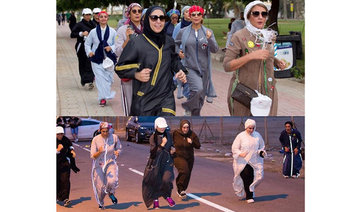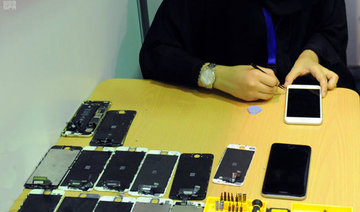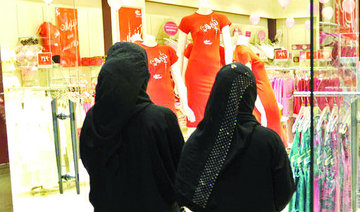RIYADH: The number of female Saudi employees in the wholesale and retail sector in private sector companies stood at 159,588 by the end of 2016, local media said, quoting figures released by the Ministry of Labor and Social Development.
Riyadh region topped other regions in employing female workers in private sector firms, which employed 28 percent of the total throughout the Kingdom, the report said.
On the other hand, 2016 registered a growth of 8 percent in the employment of Saudi female staff in the finance and real estate sectors, compared to figures of 2015, with 147,398 female employees.
Earlier, the ministry identified 19 professions which should be occupied by Saudi nationals including senior human resources managers in government and private firms; heads of personnel sections; heads of labor and workers affairs; heads of personnel affairs; specialist in personnel affairs; clerk (personnel affairs); clerk (employment); clerk (employee affairs); clerk (timekeeping); clerk (general reception); clerk (hotel reception); clerk ( patient reception); clerk (grievances); treasurer; security guard (special); clerk (government relations); typewriter key repair; customer clearance; and female workers in women’s requirement shops.
Meanwhile, the ministry suspended renewal of work permits of expatriates occupying jobs to be filled by Saudi nationals and ordered companies not to transfer services of foreigners to them. It said penalties will be levied against companies employing expat workers in jobs limited to Saudi nationals. The ministry also ordered that work and jobs in closed shopping malls be limited to Saudi male and female employees.
Ministry spokesman Khalid Aba Al-Khail said the above Saudization decision contains a time frame for application and locations to be determined by the Minister of Labor and Social Development in accordance with labor market requirements and data of work applicants.
Over 159,000 Saudi women employed in wholesale and retail sector in 2016
Over 159,000 Saudi women employed in wholesale and retail sector in 2016

MWL chief receives Pakistani National Assembly speaker

- Sadiq praised the Islamic and international efforts of the league
MAKKAH: Dr. Mohammed bin Abdulkarim Al-Issa, secretary-general of the Muslim World League and chairman of the Organization of Muslim Scholars, received Sardar Ayaz Sadiq, speaker of the National Assembly of Pakistan.
During the recent meeting at the league’s headquarters in Makkah, the two sides discussed a number of issues of mutual interest.
Sadiq praised the Islamic and international efforts of the league, including its endeavors to promote Islamic unity, serve Muslim minorities, combat Islamophobia, address the issue of girls’ education in Muslim communities and represent the Islamic world commendably in international forums.
During his tour of the Kingdom, the Pakistani speaker held meetings with Riyadh Gov. Prince Faisal bin Bandar, Madinah Gov. Prince Salman bin Sultan, Shoura Council Speaker Sheikh Abdullah Al-Asheikh and Grand Mufti Sheikh Abdulaziz Al-Asheikh.
Hollywood pioneer to inspire filmmakers in Jeddah

- Red Sea Labs Directors’ Program to mark ‘bold step’ with Spike Lee at its helm
JEDDAH: A new Directors’ Program by Red Sea Labs led by acclaimed filmmaker Spike Lee will begin in Jeddah on Tuesday.
Held until May 3, the program will bring together 15 emerging filmmakers from the Kingdom, the Arab world, Asia and Africa.
Lee is known for his bold vision and storytelling that tackles critical social issues with artistic depth. Under his mentorship, the filmmakers will dive deep into the art of directing through masterclasses, workshops and personalized sessions.
The program will also connect them directly with world-renowned figures in the industry and equip them with the skills to elevate their careers.
Shivani Pandya Malhotra, managing director of the Red Sea Film Foundation, said: “Welcoming Spike Lee back to Jeddah to lead the first edition of our Directors’ Program is a groundbreaking moment.
“It’s an extraordinary opportunity for emerging filmmakers and writers to be inspired, challenged and guided by one of the greatest cinematic minds of our time.”
Ryan Ashore, head of Red Sea Labs, added: “The Directors’ Program marks a bold step in our mission to nurture regional talent and link them to the global filmmaking community.
“Having Spike Lee lead this program sets a powerful precedent — offering participants direct access to the craft, passion and conviction that define great cinema.”
Red Sea Labs also runs three other programs such as the Lodge, an intensive training initiative in partnership with Torino Film Lab and sponsored by Film AlUla, guiding Saudi, Arab, Asian and African filmmakers from ideas to finished projects.
The Music and Sound Program offers hands-on training in film scoring and sound design with guidance from world-renowned experts.
SeriesLab, in partnership with Film Independent, supports 14 emerging creators in developing and pitching TV series pilots, including a two-week residency in Los Angeles. The program concludes at the Red Sea Souk, offering creators a chance to pitch to top international buyers, studios and producers.
Previous initiatives have included programs like the Short Film Klinik, the Middle East Media Initiative and the Music for Film workshop, all part of Red Sea Labs’ mission “to shape the next generation of global storytellers in Saudi Arabia and the world.”
Sydney to host Saudi orchestra concert

- The concert marks the seventh stop on the Saudi National Orchestra and Choir’s global tour
RIYADH: Saudi Arabia’s Music Commission will host the “Marvels of Saudi Orchestra” concert on May 12 at the iconic Sydney Opera House in Australia.
It will be held under the patronage of Culture Minister and Music Commission Chairman Prince Badr bin Abdullah bin Farhan.
The concert marks the seventh stop on the Saudi National Orchestra and Choir’s global tour, the Saudi Press Agency reported.
It will showcase works highlighting the rich musical heritage and artistic diversity of Saudi Arabia.
Australia’s Metropolitan Orchestra will join the performance with Australian compositions, while a special collaborative piece will blend elements from both nations’ musical traditions.
The Theater and Performing Arts Commission will also contribute several performance pieces to the program.
Previous performances have taken place at prestigious venues in Paris, Mexico City, New York, London, Tokyo, and Riyadh. These concerts have received critical acclaim worldwide, demonstrating Saudi music’s growing influence on the international stage.
The “Saudi Orchestra Masterpieces” series aims to deliver extraordinary musical experiences that celebrate Saudi cultural heritage while exploring new creative territories.
Each performance takes audiences on a journey through traditional Saudi musical expressions, presenting the Kingdom’s diverse artistic landscape through harmonious musical narratives.
This Sydney performance continues the commission’s broader initiative to elevate Saudi musical compositions in global cultural conversations and celebrate the authentic melodies that define the Kingdom's musical identity.
Kingdom arrests 19,328 illegals in one week

RIYADH: Saudi authorities arrested 19,328 people in one week for breaching residency, work and border security regulations, the Saudi Press Agency reported on Saturday.
A total of 11,245 people were arrested for violations of residency laws, while 4,297 were held over illegal border crossing attempts, and a further 3,786 for labor-related issues.
The report showed that among the 1,360 people arrested for trying to enter the Kingdom illegally, 54 percent were Ethiopian, 44 percent Yemeni, and 2 percent were of other nationalities.
A further 79 people were caught trying to cross into neighboring countries, and 22 were held for involvement in transporting and harboring violators, the SPA reported.
The Ministry of Interior said that anyone found to be facilitating illegal entry to the Kingdom, including providing transportation and shelter, could face imprisonment for a maximum of 15 years, a fine of up to SR1 million ($260,000), as well as confiscation of vehicles and property.
Suspected violations can be reported on the toll-free number 911 in the Makkah and Riyadh regions, and 999 or 996 in other regions of the Kingdom.
How Saudi forestry supports biodiversity and mitigates the effects of climate change

- Despite its arid climate, Saudi Arabia is home to diverse forest types, from mountain woodlands to coastal mangroves
- The Kingdom is expanding its green cover by planting millions of trees and restoring degraded forest areas
RIYADH: It is easy to think of Saudi Arabia as a land dominated by endless dunes and sun-scorched plains. But beyond the sweeping deserts lies an unexpectedly rich tapestry of ecosystems — forests that climb mountains, shade winding valleys, and line the coastal edges of the Red Sea and Arabian Gulf.
While forests cover just 1.1 percent of the Kingdom’s landmass, they play an outsized role in preserving biodiversity, storing carbon, and improving food security. Their ecological importance — and their fragility — has placed them at the heart of Saudi Arabia’s green transformation.

“The forest area in the Kingdom of Saudi Arabia is estimated to 2.7 million hectares, representing 1.1 percent of the Kingdom’s area,” Najeeb Alsubhi, head of the Valley Forests Department at the National Center for Vegetation Cover Development and Combating Desertification, told Arab News.
“This includes mountain forests spread across the southern and southwestern parts of the Kingdom, distinguished by juniper trees, as well as the atam (wild olive) tree, in addition to groups of acacia trees.”
Mountain forests trace the high ridgelines from Taif down to Jazan, while valley forests — dotted with sidr and acacia — stretch through much of the country’s interior. Along the coastlines, clusters of mangroves thrive in tidal wetlands, providing critical habitat and natural coastal defenses.
Despite their modest footprint, these forests are ecological powerhouses. Globally, forests are known to contribute more than 80 percent of biodiversity, regulate climate, limit desertification, and provide essential products from honey to medicinal plants.
In Saudi Arabia, they are also a buffer against desert creep and climate shocks — an increasingly vital role as the Kingdom confronts environmental challenges.

To protect and expand this natural wealth, Saudi Arabia has launched a forest conservation and rehabilitation drive, led by the NCVC. The center is planting more than 3.5 million trees and working to protect native species by mapping and restoring perennial tree habitats.
Recognizing the growing threat of wildfires, the NCVC has also established dedicated forest and fire monitoring systems, alongside research centers and public education initiatives aimed at long-term forest sustainability.
Among the most significant of these efforts is a new project to assess the health and changes in forest cover across five key regions: Al-Bahah, Jazan, Asir, Najran, and Taif.
DID YOU KNOW?
• Saudi forests are home to 97 species of tree and cover 2.7 million hectares of the Kingdom’s territory.
• Healthy forests contribute more than 80 percent of the biodiversity found in the natural environment.
• Although predominantly desert, Saudi Arabia also has mountain forests, valley forests, and mangroves.
This initiative, part of the National Forest Inventory Program, is a collaboration between the NCVC and the UN Food and Agriculture Organization. The project is designed to support sustainable forest management while meeting international environmental reporting obligations related to biodiversity, climate change, and land use.
Strategies include data collection, identifying key forest locations, and using precision tools like digital hypsometers to measure tree height and forest structure.

Together, these efforts reflect a growing awareness of the vital role Saudi Arabia’s forests play — not only as ecological assets but as symbols of renewal in a land long known for its arid extremes.
As the Kingdom pushes ahead with its broader climate and environmental goals, these green sanctuaries, hidden among the peaks and valleys, may prove to be among its most valuable treasures.























